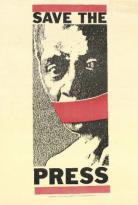|
03 May 2010
Access to information a vital tool for media
South Africa was given the right to know through the passing of the Promotion of Access to Information Act 2 (PAIA) in 2000. The rights of access to information and freedom of expression sit alongside each other in our Constitution's Bill of Rights and form the two most powerful pillars of support for any journalist in their pursuit of truth. However, nearly a decade later, the media has generally still not engaged with the potential power of PAIA in their work.
Investigative journalism has much to gain from using PAIA - which stands as one of the most progressive access to information laws in the world. Ideally suited to long-term and multi-faceted investigations, it allows journalists to apply a constant form of regulated pressure when requesting information from both public and private bodies, whilst being able to pursue other investigatory avenues at the same time. All too often, direct and informal searches for truth aren't even able to make it through the door. But, by using the mechanisms of PAIA to ask for information, a formal process is triggered that makes it much more difficult to ignore requests which promotes greater accountability. It is an additional tool in the investigators arsenal and, when used creatively, can expose stories of incredible journalistic value: it was through a proper utilisation of the United Kingdom's access to information laws that journalist Ben Leapman broke the parliamentarian expense's scandal.
Closer to home Stefaans Brummer, an investigative journalist for the Mail & Guardian, sought to use PAIA to gain access to communications between Zola Skweyiya (as Minister of Social Development) and an IT consortium with links to Sandy Majali, the man at the centre of the Oilgate scandal. While this was part of a continued investigation into Oilgate, the Brummer case had an unexpected but positive outcome: when his access to the records was refused, Brummer successfully challenged as unconstitutional the previously restrictive time periods PAIA had for bringing forward a case, which served as a major coup for assisting all future users of PAIA who may have to challenge decisions in court.
In celebration of World Press Freedom we should work together to push the boundaries of PAIA in our country, both in pursuit of furthering the freedom of our press and in the interests of our public. PAIA, when properly utilised, will stand as a powerful contribution of South Africa to the objectives of an emancipated media both locally and throughout the world. |







